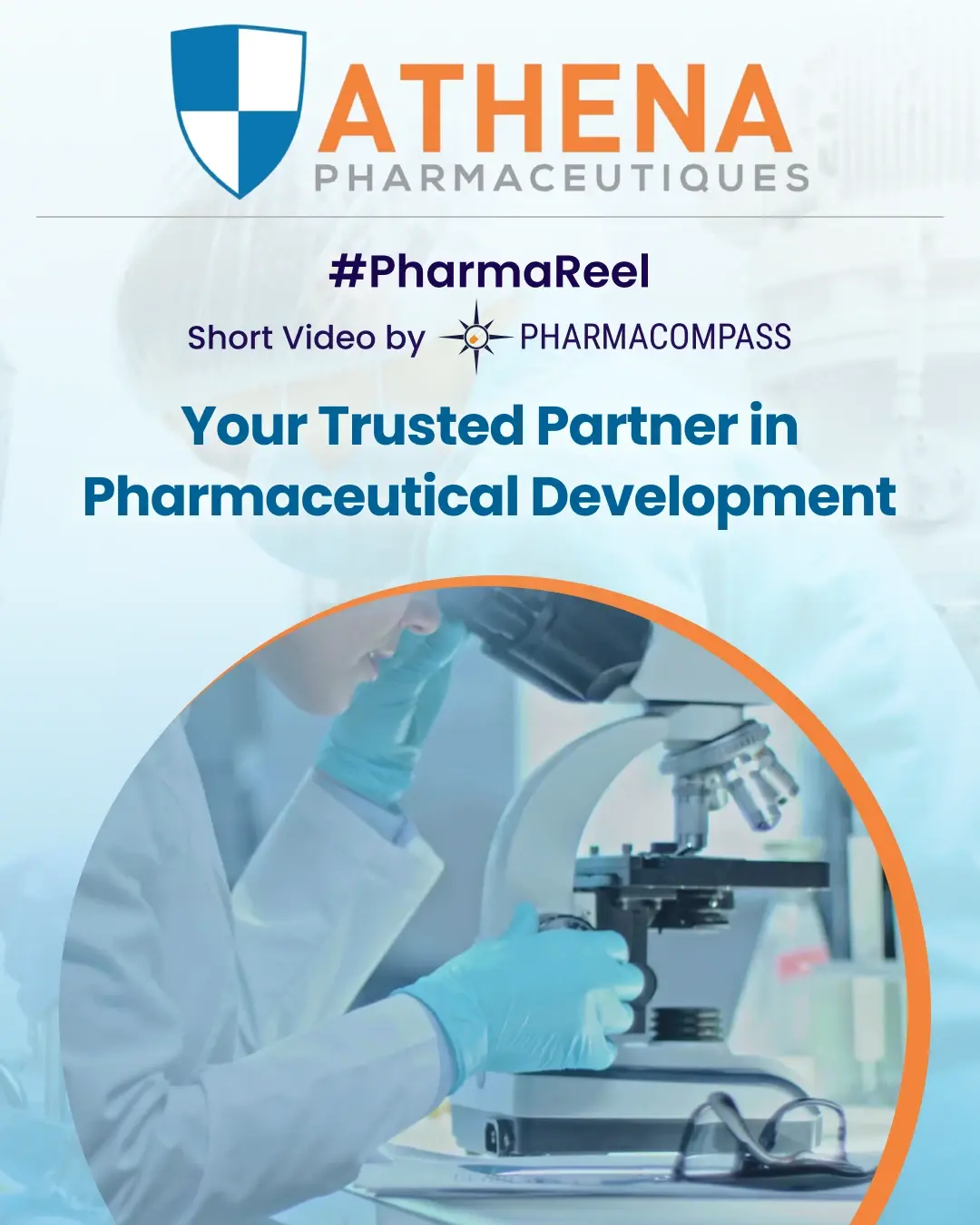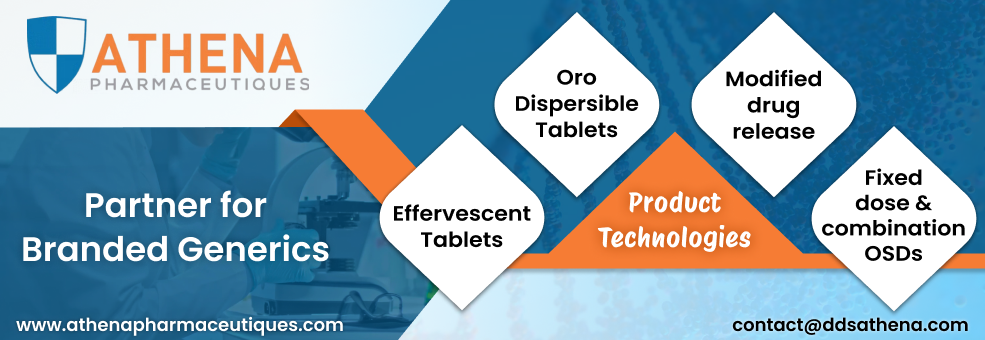Overview of oral solid dosage forms (OSD) like orodispersible tablets (ODTs) & more on Athena's CDMO services for oral drug delivery on PharmaCompass.
Q1. What is oral drug delivery?
Oral drug delivery (ODD) is the most preferred and convenient route of drug administration due to high patient compliance, cost-effectiveness, low sterility constraints, flexibility in the design of user-friendly dosage forms, innovative unit-dose solutions, and ease of production.
Oral formulations are introduced into the body by several routes of administration including oral and buccal, amongst various others. Many drugs can be administered orally as liquids, capsules, tablets, effervescent tablets, oral sticks, chewable tablets, etc.
Drugs administered orally (e.g., tablets, capsules,, solutions, oral suspensions, etc.) are placed in the mouth and swallowed. Although a few drugs taken orally are intended to be dissolved in the mouth such as Orally Disintegrating Tablets (ODTs).
The oral route is by far the most common route of drug administration in the gastrointestinal tract and can be used for both systemic drug delivery and for treating local gastrointestinal diseases. Formulations can also be designed to enhance pharmaceutical drug delivery to specific regions in the upper or lower gastrointestinal tract.
As seen above, oral drug delivery is facilitated by oral formulations including solid dosage products and liquid oral forms.
Oral solids include tablets, oral films, chewable capsules, chewable tablets, powders, granules, enteric coated solids, sticks, orally disintegrating tablets (ODT), etc. User-friendly dosage forms and innovative unit-dose solutions including tablets and capsules have a high degree of drug stability and provide accurate dosage, and are therefore preferred.
On the other hand, liquid oral forms include oral suspensions, syrups, elixirs, spirits, drops, etc. Out of these liquids, oral suspensions and solutions are the most widely used liquid oral forms.
Various pharmaceutical organizations offer specialized services and formulations which facilitate oral drug delivery such as Contract Manufacturing Organizations (CMOs) and Contract Development and Manufacturing Organizations (ie. pharmaceutical CDMO for oral drug delivery).
Some Advantages of Oral Drug Delivery
- Safe, good patient compliance, ease of ingestion, and pain avoidance.
- Versatility to accommodate various types of drugs.
- Cheap and economical formulations.
- User-friendly dosage forms and innovative unit-dose solutions.
- Patients can self-administer oral formulations and oral films.
- No sterile precautions are needed and danger of acute drug reactions is minimal.
Q2. What are the different types of solid oral dosage forms?
Solid oral forms or oral solid dosage (OSD) forms refer to a final drug product therapy that is ingested through the mouth, dissolved in the digestive system, and delivered to the body through absorption into the bloodstream.
Tablets, capsules, soft gels, effervescent formulations (effervescent tablets), oral films, lozenges, oral disintegrating tablets (ODT) and pills, are all oral solid dosage products. They are relatively easy to administer and it’s easy to distinguish one OSD product from another. Furthermore, OSD commercial and clinical manufacturing methods are well understood and well-developed.
Some Types of Solid Oral Dosage Forms or Solid Oral Forms
- Tablets
The oral route of drug administration is the most convenient for patients, with tablets emerging as the most popular solid oral dosage forms used today. Tablets are solid dosage products containing one or more active pharmaceutical ingredients (APIs) and functional excipients. They are usually circular in shape and may be flat or convex.
These unit dosage forms are accurate, stable and offer great precision and low variability. Furthermore, tablets are the cheapest oral dosage form, easy to handle and use, and have an attractive and elegant appearance.
Tablets ingested orally include compressed tablets, press coated tablets, multilayer tablets, sustained action tablets, enteric located tablets, sugar coated tablets, oral disintegrating tablets (ODT), film coated tablets and chewable tablets, while tablets used in the oral cavity include buccal tablets, sublingual tablets, lozenges, and dental cones.
Standard compressed, controlled-release and coated tablets are the most common form of solid oral forms or oral formulations for pharmaceutical drug delivery to the gastrointestinal tract.
- Capsules
Capsules are common dosage forms for oral administration of pharmaceutical and nutraceutical products. They are produced in various shapes, sizes and materials, and each capsule generally contains a single dose of active pharmaceutical ingredients (APIs).
In addition to the active pharmaceutical ingredient (API), other functional excipients are incorporated into the fill material, including antimicrobial preservatives, fillers, flavouring agents, sweeteners and colouring agents. Capsules are available in the form of hard gelatin capsules, soft gelatin capsules, modified release capsules and enteric coated capsules.
Capsule oral solid dosage forms (OSD) are smooth and easy to swallow, easy to handle and carry, economically feasible, therapeutically inert, attractive in appearance, and can be taste-masked, amongst various other benefits which make them a popular pharmaceutical dosage form.
- Powder
A powder is a mixture of finely divided drugs and/or chemicals in dry form including active pharmaceutical ingredients (APIs) and inert functional excipients. Powders can be used internally and externally (e.g., external applications to the skin). Dry powders, however, can be taken orally by some patients who are unable to swallow other solid dosage forms such as capsules and tablets.
The onset of action of powders is rapid as compared to tablets and capsules, small children and elderly patients can take powdered drugs as is or dissolved in water easily, and it is more economical as compared to other solid dosage forms because it doesn’t require any special machinery or technique.
Q3. Why is outsourcing key to bringing flexibility and capacity to oral solid dosage form manufacturing?
The trend towards outsourcing oral solid dose commercial and clinical manufacturing has been driven by the ever more complex nature of new molecules. Innovators are choosing to share the burden of challenges relating to bioavailability, formulation, stability, manufacturability and most importantly, scalability (commercial capabilities; scale-up and full commercial manufacturing).
Industry pressures to reduce pharmaceutical development times and costs, as well as increasing numbers of smaller drug developers now taking products to market independently, are spurring partnerships with contract development and manufacturing organizations (specialist CDMOs) who can bring formulation development and manufacturing expertise, global experience and broad service offerings.
A contract development and manufacturing organization (CDMO) is a company within the pharmaceutical industry that provides CDMO services ranging from drug product pharmaceutical development and manufacturing to pharmaceutical packaging. Companies partner with pharmaceutical CDMOs as a way to outsource drug development and manufacturing services to third-parties.
Working with a contract development and manufacturing organization (CDMO) allows drug companies to benefit from a long-term partnership with an experienced team offering operational excellence, specific scientific skills, equipment and technical resources that are not available internally, resulting in a robust supply chain, reduced risks and optimized costs.
A CDMO for oral drug delivery offers various CDMO services such as oral solid dose (OSD) formulation development, drug development and manufacturing services (cGMP manufacturing), oral drug delivery technologies, clinical manufacturing, scale-up and full commercial manufacturing (commercial capabilities), etc.
Outsourcing is Key to Bringing Flexibility and Capacity to Oral Solid Dosage Form Manufacturing:
- Flexibility
Outsourcing oral solid dosage form manufacturing to experienced contract manufacturers gives partnering companies access to cutting edge pharmaceutical drug delivery technology on a need basis, thereby giving the organization flexibility. This is important as owning novel oral drug delivery technologies can be very costly.
- Capacity
Outsourcing the production of oral solid dose (OSD) forms reduces excess production capacity by divesting facilities and minimizes investments in capital intensive facilities. An oral drug delivery CDMO can make strategies to lower company expenses by reducing fixed costs and modifying its capacities.
Q4. What are the trends and challenges in oral solid dosage outsourcing?
Some Trends In Oral Solid Dosage Outsourcing
- The overriding trend is continued oral solid dosage outsourcing, by big pharmaceutical organizations due to divesting commercial and clinical trial manufacturing and small-to-mid-sized companies that do not have commercial capabilities and clinical trial manufacturing capacities.
- The requirement for more complex oral solid cGMP manufacturing processes is leaving many developers struggling to find the right technical set-up that is manageable from a cost standpoint. Outsourcing to a pharmaceutical CDMO for oral drug delivery that can offer a broad range of specialist CDMO services such as scale-up and full commercial manufacturing help simplify supply chains.
- As drug companies have fewer and fewer new compounds entering their R&D pipelines, outsourcing of development and commercial activities along with clinical trial manufacturing for oral solid dosage forms (OSD) and sterile forms is on the rise.
- Companies find outsourcing easier in recent times due to technological advancements, knowledge sharing platforms, and increasing convergence between various government regulatory authorities.
- Working with a specialist CDMO for oral drug delivery minimizes the need for in-house resources. Drug developers can take advantage of specialized oral drug delivery technologies for the manufacture of controlled release products, as well as the capability to produce combination products with several APIs.
The above mentioned factors are expected to drive the global oral solid dosage contract manufacturing market in the near future.
Some Challenges In Oral Solid Dosage Outsourcing
- In-house production of oral solid dosage forms (OSD) provide companies ultimate control over the quality and the quantity of products. Also, the company can easily change scope, adjust timelines and increase or decrease the volume of oral solids based on the market demand. Outsourcing production of oral solids hands this power over to the CDMO facility.
- Contract manufacturing organizations (CMOs) may fail to deliver supplies of the oral solid dose (OSD) on time as per the requirement. There is also a reduction in in-house cGMP manufacturing expertise in terms of resources and process knowledge for manufacturing oral solids. Furthermore, there could be a risk of non-compliance of regulatory requirements by a CMO or CDMO for oral solids.
- In outsourcing, customers give up all decision making to the contracted company. If the wrong innovative CDMO for oral solids is chosen which doesn’t match their partners’ needs, it could lead to a bad customer experience. Furthermore, differences in standards of specialized services could lead to quality problems.
Carefully selecting a CMO or CDMO for oral solids can help avoid the above given challenges associated with oral solid dose (OSD) outsourcing. A logical first step in selecting a CMO (contract manufacturing organization) or a CDMO (contract development and manufacturing organization) involves making an assessment of internal capabilities, strengths, and needs that can then be overlaid on anticipated external requirements. Following which, the criterions for selecting a compatible CMO or CDMO for oral solids are divided into two broad categories, namely culture and quality
Q5. What oral drug delivery services does Athena offer?
Athena with its EU GMP approved facility and state-of-art R&D centre is focused on innovative and value-added products in mature and emerging markets and engages in licensing and pharmaceutical development models for specialty pharma, multinationals, and other established companies.
Athena’s specialities include Oral Dispersible Tablets (ODTs), Customized Drug Release, and Fixed Dose Combinations. Athena provides comprehensive formulation development, contract manufacturing (cGMP manufacturing), and product lifecycle management solutions for oral solids, multi-particulate systems, effervescent formulations (effervescent tablets), sticks etc. based on its proprietary drug delivery technology platforms.
Athena, which functions as an oral drug delivery CDMO offering drug development and manufacturing specialized services, has developed a broad range of drug delivery technology platforms for oral delivery with a special focus on modified release formulations as well as orodispersible dosage forms.
The innovation team at Athena has been developing products at different stages for various MNC clients and is equipped to handle complex products and technologies for both advanced and emerging markets. Athena has a broad range of drug delivery platforms. All these platforms are for oral drug delivery and are validated.
- Orally Disintegrating Tablets (ODT)
- Customized Drug Release (SR; EC; Zero order; Sublingual)
- Extended release technology
- Multi-particulate systems via its multi-particulate control release technology
- Fixed Dose Combination (FDC)

 KEY PRODUCTS
KEY PRODUCTS KEY SERVICES
KEY SERVICES
![]() Your Trusted Partner in Pharmaceutical DevelopmentYour Trusted Partner in Pharmaceutical Development
Your Trusted Partner in Pharmaceutical DevelopmentYour Trusted Partner in Pharmaceutical Development






